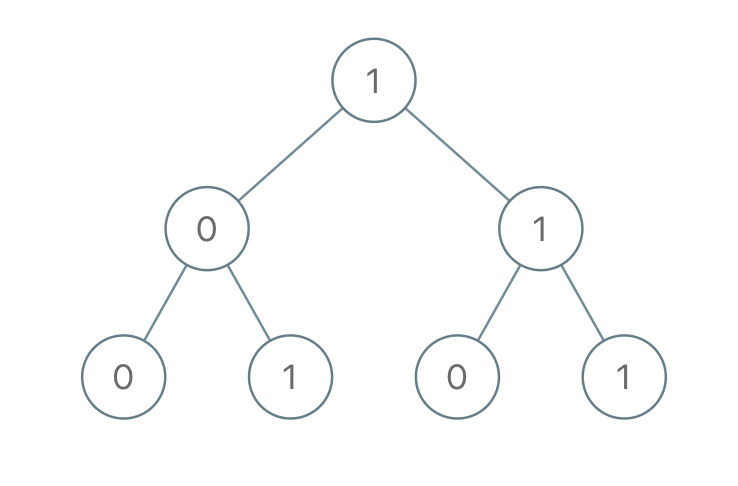| comments | difficulty | edit_url | rating | source | tags | |||
|---|---|---|---|---|---|---|---|---|
true |
Easy |
1462 |
Weekly Contest 131 Q2 |
|
You are given the root of a binary tree where each node has a value 0 or 1. Each root-to-leaf path represents a binary number starting with the most significant bit.
- For example, if the path is
0 -> 1 -> 1 -> 0 -> 1, then this could represent01101in binary, which is13.
For all leaves in the tree, consider the numbers represented by the path from the root to that leaf. Return the sum of these numbers.
The test cases are generated so that the answer fits in a 32-bits integer.
Example 1:
Input: root = [1,0,1,0,1,0,1] Output: 22 Explanation: (100) + (101) + (110) + (111) = 4 + 5 + 6 + 7 = 22
Example 2:
Input: root = [0] Output: 0
Constraints:
- The number of nodes in the tree is in the range
[1, 1000]. Node.valis0or1.
We design a recursive function dfs(root, t), which takes two parameters: the current node root and the binary number corresponding to the parent node t. The return value of the function is the sum of the binary numbers represented by the path from the current node to the leaf node. The answer is dfs(root, 0).
The logic of the recursive function is as follows:
- If the current node
rootis null, then return0. Otherwise, calculate the binary numbertcorresponding to the current node, i.e.,t = t << 1 | root.val. - If the current node is a leaf node, then return
t. Otherwise, return the sum ofdfs(root.left, t)anddfs(root.right, t).
The time complexity is
# Definition for a binary tree node.
# class TreeNode:
# def __init__(self, val=0, left=None, right=None):
# self.val = val
# self.left = left
# self.right = right
class Solution:
def sumRootToLeaf(self, root: TreeNode) -> int:
def dfs(root, t):
if root is None:
return 0
t = (t << 1) | root.val
if root.left is None and root.right is None:
return t
return dfs(root.left, t) + dfs(root.right, t)
return dfs(root, 0)/**
* Definition for a binary tree node.
* public class TreeNode {
* int val;
* TreeNode left;
* TreeNode right;
* TreeNode() {}
* TreeNode(int val) { this.val = val; }
* TreeNode(int val, TreeNode left, TreeNode right) {
* this.val = val;
* this.left = left;
* this.right = right;
* }
* }
*/
class Solution {
public int sumRootToLeaf(TreeNode root) {
return dfs(root, 0);
}
private int dfs(TreeNode root, int t) {
if (root == null) {
return 0;
}
t = (t << 1) | root.val;
if (root.left == null && root.right == null) {
return t;
}
return dfs(root.left, t) + dfs(root.right, t);
}
}/**
* Definition for a binary tree node.
* struct TreeNode {
* int val;
* TreeNode *left;
* TreeNode *right;
* TreeNode() : val(0), left(nullptr), right(nullptr) {}
* TreeNode(int x) : val(x), left(nullptr), right(nullptr) {}
* TreeNode(int x, TreeNode *left, TreeNode *right) : val(x), left(left), right(right) {}
* };
*/
class Solution {
public:
int sumRootToLeaf(TreeNode* root) {
return dfs(root, 0);
}
int dfs(TreeNode* root, int t) {
if (!root) return 0;
t = (t << 1) | root->val;
if (!root->left && !root->right) return t;
return dfs(root->left, t) + dfs(root->right, t);
}
};/**
* Definition for a binary tree node.
* type TreeNode struct {
* Val int
* Left *TreeNode
* Right *TreeNode
* }
*/
func sumRootToLeaf(root *TreeNode) int {
var dfs func(root *TreeNode, t int) int
dfs = func(root *TreeNode, t int) int {
if root == nil {
return 0
}
t = (t << 1) | root.Val
if root.Left == nil && root.Right == nil {
return t
}
return dfs(root.Left, t) + dfs(root.Right, t)
}
return dfs(root, 0)
}/**
* Definition for a binary tree node.
* class TreeNode {
* val: number
* left: TreeNode | null
* right: TreeNode | null
* constructor(val?: number, left?: TreeNode | null, right?: TreeNode | null) {
* this.val = (val===undefined ? 0 : val)
* this.left = (left===undefined ? null : left)
* this.right = (right===undefined ? null : right)
* }
* }
*/
function sumRootToLeaf(root: TreeNode | null): number {
const dfs = (root: TreeNode | null, num: number) => {
if (root == null) {
return 0;
}
const { val, left, right } = root;
num = (num << 1) | val;
if (left == null && right == null) {
return num;
}
return dfs(left, num) + dfs(right, num);
};
return dfs(root, 0);
}// Definition for a binary tree node.
// #[derive(Debug, PartialEq, Eq)]
// pub struct TreeNode {
// pub val: i32,
// pub left: Option<Rc<RefCell<TreeNode>>>,
// pub right: Option<Rc<RefCell<TreeNode>>>,
// }
//
// impl TreeNode {
// #[inline]
// pub fn new(val: i32) -> Self {
// TreeNode {
// val,
// left: None,
// right: None
// }
// }
// }
use std::cell::RefCell;
use std::rc::Rc;
impl Solution {
fn dfs(root: &Option<Rc<RefCell<TreeNode>>>, mut num: i32) -> i32 {
if root.is_none() {
return 0;
}
let root = root.as_ref().unwrap().borrow();
num = (num << 1) | root.val;
if root.left.is_none() && root.right.is_none() {
return num;
}
Self::dfs(&root.left, num) + Self::dfs(&root.right, num)
}
pub fn sum_root_to_leaf(root: Option<Rc<RefCell<TreeNode>>>) -> i32 {
Self::dfs(&root, 0)
}
}